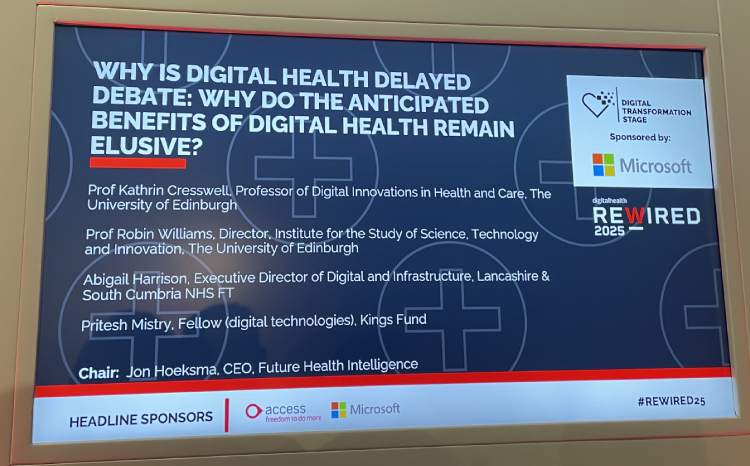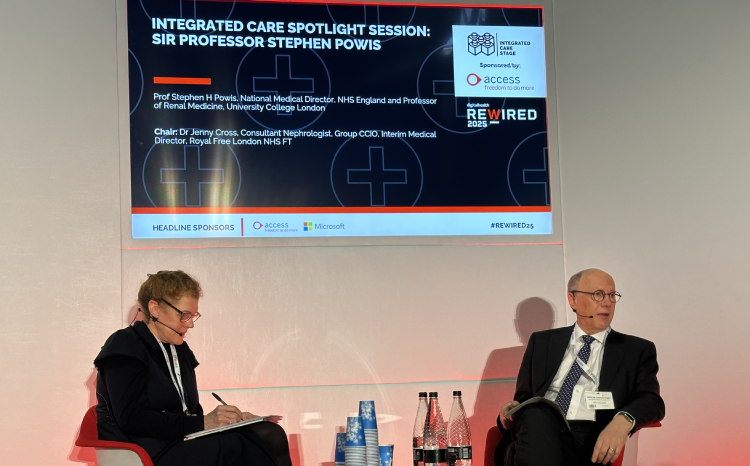King’s Fund report says digital change being driven locally
- 28 June 2018

Local areas may sometimes be more capable of driving speedy digital change than national organisations, a new report from The King’s Fund has suggested.
‘Digital change in health and social care’ was published by the independent body on June 21. Harry Evans, one of its authors, told Digital Health News he believed there was a “strong message” in the report about digital change in a local setting.
He added: “To some extent local is better at some of this stuff rather than national policy.
“Our message is that locals are starting to do this and doing it pretty well; it’s a positive message.”
The report looks at five areas across the country which are said to have made “significant progress” towards digital change: Liverpool health and social care economy, Essex Partnership University NHS Foundation Trust, Cambridge University Hospitals NHS Foundation Trust, Berkshire and Frimley and Homerton University Hospital.
After spending time with staff working in each of the areas, King’s Fund researchers picked up on what they had learnt through the process. That included details of barriers facing local organisations which are starting to implement digital technologies.
Among these were “concerns and anxiety” over what has happened in the past with NHS IT projects, and issues with projects being perceived solely as relevant to those working in tech.
The report states: “Users only positively engage with change when they see it as a clinical change, not an IT project.”
Evans said one of the surprises he found when carrying out the report was how much of digital change comes from “the bottom up”.
He said: “The report highlights how much the success of digital change relies on the clinicians to get involved and get on board.
“There are local clinicians who are really interested in improving care by using digital.”
Another barrier was information governance (IG), which is becoming an increasing concern following the introduction of the general data protection regulation (GDPR) and the NHS’s National Data Opt-out scheme, which gives patients greater control over their data.
The report states in order to securre trust with patients, “organisations need to be transparent and build a positive case for sharing information”.
In January 2018, The King’s Fund published a report arguing that fragmentation within the NHS and a lack of resources are stopping the spread of innovation.





11 Comments
Not a fan then Bertl….
You could say that. These are the most destructive policies that I have seen in my lifetime (and probably well beyond). One of the things they are destroying is any possibility of trust. I believe that trust and confidentiality are necessary conditions of any effective healthcare. The NHS have redefined confidentiality out of existence. No amount of algorithms and data analytics will ever replace these things. I cannot stop this lunacy but anyone who does not believe in it should be allowed to opt out/have their objections upheld, not ignored, circumvented or overruled under the Health and Social Care Act, section 259. This legislation is another piece of criminal lunacy.
‘The report states in order to securre trust with patients, “organisations need to be transparent and build a positive case for sharing information”.’
I disagree. These are very tired, empty words. In order to secure trust with patients, organisations need to respect patients’ right to object to data processing that contravenes the GDPR, rather than illegally overriding their objections, on the basis of the Health and Social Care Act 2012, section 259. I refer the reader to GDPR Article 6(2). Bullying and dishonesty are not a good way of building trust. Nor is deliberate misinterpretation of the law.
What are you talking about? Being transparent is the whole point of GDPR. if you get the patients consent to take part / share their data WITH their consent then it’s compliant with GDPR.
If you get the patient’s consent, then sharing their data is compliant with the GDPR. If you don’t get their consent or they don’t give their consent, and you still share their data, it is not compliant with the GDPR. The NHS is absolutely determined to create, share and sell complete, longitudinal, integrated care records from all care settings, for every patient in England. Will Smart, the NHS Chief Information Officer, is reported as saying (in a speech in London on 16 May 2018) that this is his vision and that it should be “fairly easy to pull off” in the next four years or so.That cannot be done on the basis of consent, so they will do what they have been doing for the last four or so years, namely ignore, circumvent or override patients’ objections and, in so doing, contravene the GDPR. Try objecting, and you will find out what I am talking about. What I am saying is that nobody will ever build trust by behaving in this way. Talking about building trust while they continue to behave in this way is just spouting empty words.
Right, I agree with you 100% – patient consent is a must. It is not ethical or lawful to use their data without consent.
However, you did not justify or explain your stance in your initial post. It seemed like you were aiming your ire at the people who conducted the research on behalf of the king’s fund, which is a pretty well regarded establishment with plenty of good work behind them.
I know that the King’s Fund is well regarded, but I am irritated by the researchers’ disingenuous suggestion, which I have heard, ad nauseam, from people being equally disingenuous, that all is needed to get everyone on board is to push the case for data sharing harder, be transparent and build the trust of the public. When will someone acknowledge that the problem is NOT failure to push the case for data sharing, but failure to acknowledge the case, for many people, against data sharing. All the obfuscation, evasion, lies and duplicity are all about not acknowledging that the case for data sharing will never be accepted by everyone. The DHSC/NHS will not acknowledge this and are trying to coerce everyone into sharing their data with people they absolutely do not trust – primarily because of all the duplicity, lies and attempted coercion. The researchers will not tell the truth, but just perpetuate the tired old fiction that the problem is that we don’t understand the benefits of data sharing. The King’s Fund researchers should know better and they should tell the truth, instead of using vacuous words to avoid doing so.
I read this report today and the sections you are referring regarding “trust” seem very reasonable and have worked very well in the examples the report studied.
Would you be able to explain or shed light on which examples you are referring to where data had been shared without the patients consent?
Many, though by no means all of the problems relate to NHS Digital, which is the chosen instrument for data pillaging and which, you will remember, has been given statutory powers to collect patient data at the direction of the Secretary of State for Health or NHS England. To get an idea what kind of organisation NHS Digital is, you might like to look at the Inquiry by the Parliamentary Select Committee on Health, on the Memorandum of Understanding between NHS Digital, the Home Office and the DHSC, whereby NHS Dgital handed over patient data to the HO to help them track down undocumented migrants. The Health Committee have, I think managed to fix this but, if you can still watch the session where the CEO and the Director of NHS Digital gave oral evidence to the committee, you might find that as chilling as I did. The report of the Health Committee is very relevant.
NIHR is a virtual organisation directed by the DHSC and NHIR HIC (Health Informatics Collaborative) are building a national library of patient data for research. This comprises an ever growing number of data sets, with national medical hubs (Hospital Trust + University + Research Centre) as custodians of data sets in particular clinical areas. For these I think they obtain consent, but NHS Digital is the custodian of two HES data sets (in-patient and out-patient), both contain patient level data that NHS Digital collects from Hospitals without consent. HES data are extracted from SUS (Secondary Uses Service) data which is what NHS Digital Collects. Try telling any hospital that you have opted out of use of your confidential information for purposes beyond direct care (secondary uses), so you object to them letting NHS Digital, who are not providers of direct care, collecting SUS data relating to you! I can’t go into detail here, but your objection will be overridden on the grounds that hospitals have a statutory obligation to submit SUS data. Your national data opt out removes the legitimate purpose of collection of SUS data, so this contravenes GDPR Article 5(1) (a – f) . . . but they take the data anyway. The whole library will be catalogued for ease of reference and anyone with an approved research project can access it. This is not anonymous or unidentifiable data.
NHS Digital is also custodian for the Primary Care Data Set and they will be collecting this without consent, from GP records. Care.data has not gone away, they just dropped the name, to make us think it has gone away. Exactly the same applies as with SUS data, but in this case NHS Digital will actually access GP records and extract the data, so GPs have no control whatever and cannot fulfil their duty of confidentiality.
I could go on for a long time, but this reply is much too long already. This bullying is toxic and it will infect any system of local data sharing involving hospitals and GP practices. Public Health England is also a problem; they are very secretive about what they are doing and they certainly don’t get consent. For PHE the default setting is “presumed consent” and there is very little you can opt-out of, even in theory. I believe they are certainly selling patient data.
Wow, that’s very informative. This has really changed my opinion on a few things. Thanks for taking the time to respond.
You are welcome!
Comments are closed.